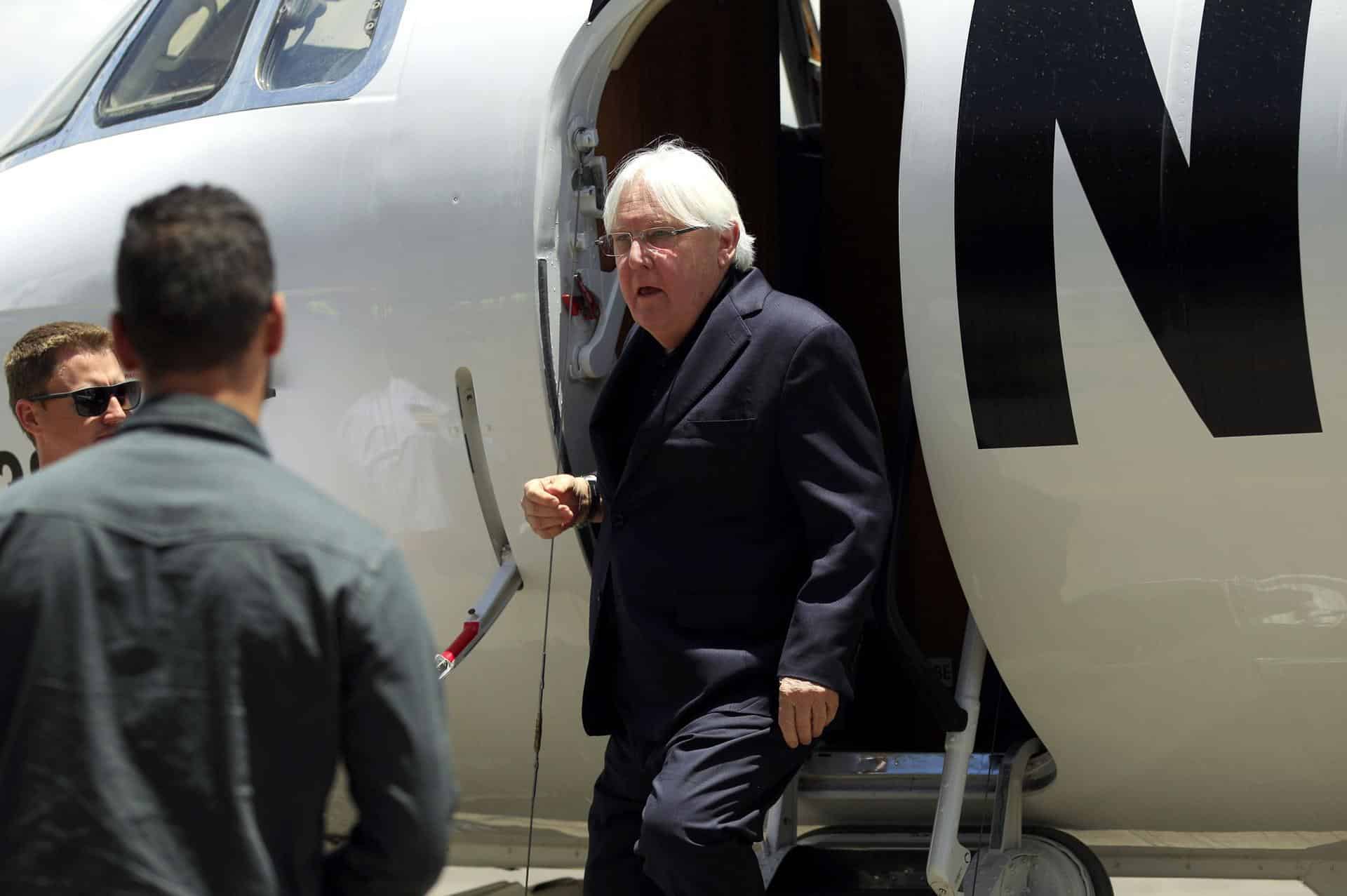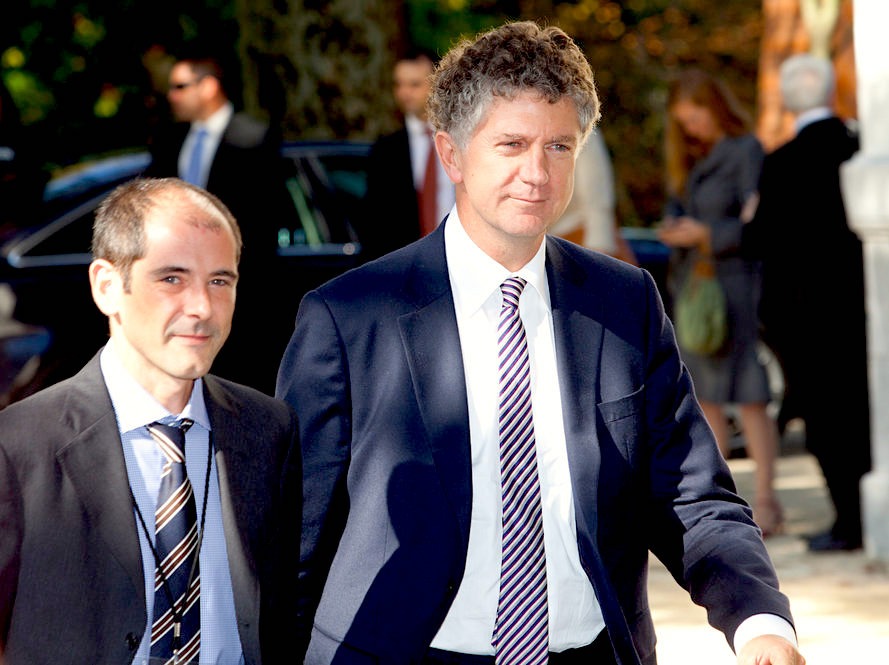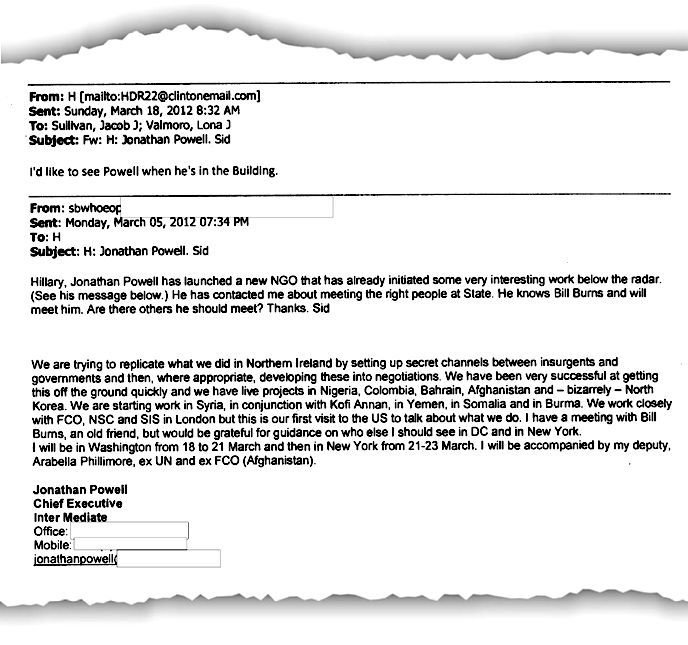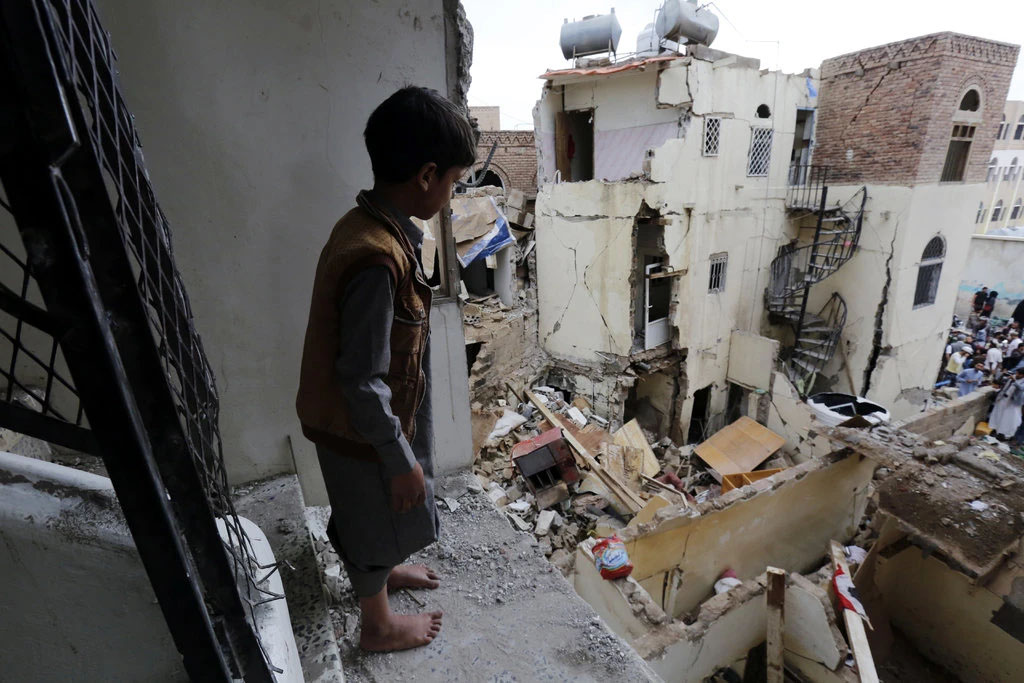
Martin Griffiths, then UN special envoy for Yemen, disembarks from a plane upon his arrival at Sanaa's international airport in Yemen on June 2, 2018. Photo: Mohammed Huwais/AFP via Getty Images.

Orinoco Tribune – News and opinion pieces about Venezuela and beyond
From Venezuela and made by Venezuelan Chavistas

Martin Griffiths, then UN special envoy for Yemen, disembarks from a plane upon his arrival at Sanaa's international airport in Yemen on June 2, 2018. Photo: Mohammed Huwais/AFP via Getty Images.
Martin Griffiths, a Briton who now runs the United Nations’ humanitarian work, co-founded and advises a private conflict resolution company that “works closely” with MI6. He was until recently the UN special envoy to Yemen.
The UN’s Under-Secretary-General for Humanitarian Affairs, Martin Griffiths, was until August 2021 the UN special envoy to Yemen, a conflict in which British special forces have been fighting.
Griffiths, 71, has held a number of prominent positions in the field of international peace building. He was previously charged with “mediating an agreement to end the conflict” in Yemen which has now raged for nearly seven years and produced the world’s worst humanitarian catastrophe.
The UK is heavily backing the Saudis in the Yemen war in an effort to restore the government of Abdrabbuh Mansour Hadi, who was forced to flee in 2015.
Declassified has found in public information that a conflict resolution company co-founded by Griffiths—for which he continues to be a “strategic advisor”—works closely with MI6 and the Foreign Office. It includes among its trustees and advisers a range of former British military and diplomatic figures.
The company, Inter Mediate, “focuses on the most difficult, complex and dangerous conflicts where other organisations are unable to operate” and “brings together some of the world’s leading experts on dialogue and negotiation.”
Inter Mediate was said by its chief executive to be “starting work” in Yemen and Syria six years before Griffiths became UN envoy to Yemen, at a time when he served as a senior UN adviser on Syria. It is not known if the company is still active in Yemen.

The findings may raise questions about the undermining of the appearance of impartiality crucial to the role of a UN special envoy and senior humanitarian official.
Promoted by the Foreign Office
The Foreign Office promoted Griffiths to become UN special envoy to Yemen in February 2018. It stated: “A successful campaign to secure the appointment of a new UN special envoy for Yemen led to the appointment of British national and international mediation expert Martin Griffiths.”
Farhan Haq, deputy spokesman for the Secretary-General of the UN, told Declassified: “Mr. Griffiths was appointed by the Secretary-General as his Envoy for Yemen in 2018 following the standard recruitment and assessment process applied to all Secretariat positions in the United Nations.”
Saudi War on Yemen Has Claimed Over 13,000 Civilian Casualties: Report
Griffiths had been propelled into a very senior UN role in 1994, becoming director of the United Nations Department for Humanitarian Affairs (DHA) in Geneva, one of the UN’s top humanitarian officials.
Previously Griffiths had for four years been chief executive of British development NGO ActionAid and had also worked at Save the Children and the UN’s children’s agency, UNICEF.
It is not known if the DHA appointment was at the behest of the UK government although there is a history of British officials being placed in senior humanitarian roles at the UN. Since 2010, all five heads of the Office for the Coordination of Humanitarian Affairs (OCHA), the successor to the DHA, have been Britons.
Saudi Arabia and the UK, which work closely together in the war in Yemen, “expressed their strong support” for Griffiths’ appointment as UN special envoy in a joint communiqué. The UK government has funded the UN special envoy’s office, providing £650,000 from the British aid budget in 2019-20.
Griffiths’ former political adviser in Yemen, Chris Halliday, took up his role by leaving his position as head of the Yemen team in the Foreign Office.
Inter Mediate was established in 2011 by Griffiths and Jonathan Powell, Tony Blair’s former chief of staff. Powell helped negotiate the Good Friday agreement in Northern Ireland and was central to UK foreign policy under Blair.
Powell has been Inter Mediate’s chief executive since its founding. A former Foreign Office official, Powell was in 2014 appointed by then prime minister David Cameron to be the UK’s special envoy to Libya, at a time when he headed up Inter Mediate.
Powell and Inter Mediate have run numerous projects funded by the Foreign Office in countries such as Burma, Libya and North Korea. Declassified found 23 payments made by the Foreign Office to the company from 2013 to 2020.
The Foreign Office told Declassified it has “provided just over £4 million to Inter Mediate between 2011-2020 to support work towards resolving international conflicts.”
Private partner
Powell has been described by the specialist media organisation, Intelligence Online, as the Foreign Office’s “private partner.” It describes Inter Mediate as conducting “discreet diplomatic missions with state funding but also private money,” though it is unclear who the private funders are, as the organisation’s accounts do not list these.
Inter Mediate’s main funders are governments, including those from Finland, Sweden, Canada and the Netherlands, as well as the UK.
In its early years, Inter Mediate recruited almost exclusively veterans from the Foreign Office and both the company and Powell appear to have good access to government ministers.
Powell met Sir Simon Fraser, the Foreign Office’s top civil servant, in February 2011, at a time the company was being established. Since then, a company representative, presumed to be Powell himself, has had meetings with several other senior British diplomats and ministers.
But a spokesperson told Declassified: “The Foreign Office was not involved in the founding of Inter-Mediate.”
It is unclear what work Griffiths undertakes as an adviser to Inter Mediate. However, the company website states that Powell “has… participated in a number of negotiations between governments and insurgent groups in Europe and Asia working closely with Martin Griffiths of the Centre for Humanitarian Dialogue”—referring to a conflict resolution centre in Geneva that Griffiths established in 1999.
A spokesperson for Inter Mediate told Declassified: “We don’t talk to the press about the work we do, or discuss details about our staff and trustees. But to be clear: Inter Mediate is a charitable organisation founded to end armed conflict around the world, building on lessons from the Northern Ireland experience and other successful peace processes.”
The spokesperson added: “We are funded by multiple governments and foundations, but have always worked entirely independently as a non-governmental organisation and have no special relationship with any government. We publish the sources of our funding annually in accordance with the Charity Commission rules.”
A Foreign Office spokesperson told Declassified: “The UK engages with a wide range of international NGOs and other groups to discuss best practice for conflict mediation in a number of countries.”
It added: “Inter-Mediate is one of many well-respected mediation organisations, with which we have discussed Yemen, Libya and other conflicts.”
Close to MI6
In an email disclosed by the US government, Powell wrote that Inter Mediate is close to MI6. He told a senior aide to Hillary Clinton, then the US secretary of state, in March 2012 that “we work closely with FCO [Foreign and Commonwealth Office], NSC [National Security Council] and SIS [Secret Intelligence Service] in London.”
The UK’s National Security Council is the main government body for discussing British security objectives and is chaired by the prime minister.
Informed of Powell’s presence in Washington DC later in the month, Clinton replied: “I’d like to see Powell when he’s in the Building.” Powell was eventually scheduled to meet Clinton’s deputy chief of staff Jacob Sullivan, who is now President Biden’s National Security Adviser.
It also appears Powell met briefly with Clinton in her offices. Powell also met William Burns, then deputy secretary of state, who he called an “old friend.” Burns, a career diplomat, is now director of the CIA.

In his email, Powell added that Inter Mediate sets up “secret channels between insurgents and governments” and was working in Nigeria, Colombia, Bahrain, Afghanistan and North Korea. He continued: “We are starting work in Syria, in conjunction with [former UN secretary general] Kofi Annan, in Yemen, in Somalia and in Burma.”
Clinton’s aide noted that Inter Mediate works “under the radar.”
A ‘Whataboutist’ Response to the Useful Idiots of the Anglo-American Empire
‘Security intelligence’
Despite co-founding Inter Mediate, Griffiths has never been a director of the company. Its four founding directors include Christopher James, a senior veteran of MI6 and the SAS, who served on the Inter Mediate board for five years until 2016. James headed the MI6 section responsible for liaising with British firms.
After leaving MI6, James founded in 1995 the business intelligence firm Hakluyt, which is known for its connections to MI6 and as being “a convenient rest home for MI6 men”. Hakluyt was reportedly set up with the blessing of then MI6 chief, Sir David Spedding.
Hakluyt’s current managing partner, Varun Chandra, previously worked at Inter Mediate, and, like Jonathan Powell, was also an adviser to Tony Blair Associates, the former prime minister’s private consultancy company. Haklyut has access to the highest levels of government—Declassified found 12 meetings or telephone calls between the company and ministers or senior civil servants between 2011 and 2021.
In November 2020, prime minister Boris Johnson appointed Hakluyt’s global head of corporate clients, Dan Rosenfield, as his chief of staff.
Inter Mediate was, for a brief period soon after its incorporation, registered at the London office of another company set up by MI6 veteran Christopher James called Corporates for Crisis (CforC), a “corporate intelligence” firm.
Soon after, in July 2012, it was reported that Griffiths “recently worked for CforC.” The company’s managing director during 2008-10 was Brigadier Ed Butler, a former commander in the SAS.
Other senior UK military officers are associated with Inter Mediate. General Nicholas Houghton, the former chief of the defence staff, Britain’s most senior military officer, became a “strategic advisor” to Inter Mediate in 2017, where he was “in charge of South East Asian business.”
Baron Richards of Herstmonceux, another former chief of the defence staff, also reportedly worked at Inter Mediate on Southeast Asia around 2015-17.
Incorporated as a private company under the name IM01, Inter Mediate is also registered as a UK charity. The company, which is located close to Whitehall, states that “an able core team working out of a single office in London supports the founders and experts.”
In 2021-22, Inter Mediate had an income of £1.4m and ran nine funded projects in the Americas, Africa, the Middle East and Asia.
Career path
Griffiths’s links to MI6 raise questions in light of UK special forces being party to the conflict in Yemen on which he previously led UN negotiations. In 2019, it was reported that “at least five British special forces commandos had been wounded in gun battles as part of a top-secret UK military campaign in Yemen.”
The men, from the Special Boat Service (SBS), received the injuries from battles in the Sa’dah area of northern Yemen, where “up to 30 crack British troops are based,” it was claimed.
The operations of UK special forces are opaque and guarded from transparency laws, but it is known that MI6 works closely with the SBS and the army’s equivalent, the Special Air Service (SAS). A recent article in the Daily Telegraph noted that “SAS personnel serve as a wing of MI6 while remaining under military command.”
The SAS has operated inside Yemen. In January 2019, a 12-man US/UK special forces task force, comprising the SAS and the US Green Berets, was reportedly flown into Yemen from Djibouti, ostensibly on an “humanitarian mission.”
The soldiers were dressed in Arab clothing and were reported to be operating near the government-held town of Marib in central Yemen.
Declassified revealed in 2021 that Britain had a secret detachment of up to 30 troops at Al-Ghaydah airport in eastern Yemen, where they were training Saudi forces.

The Foreign Office did not respond to Declassified’s request for information on Griffiths’ diplomatic career, which is unclear. Information suggests that Griffiths’ sole diplomatic position was as a press spokesperson for the British embassy in South Africa in 1985-7.
Griffiths’ career path has seen him work for humanitarian agencies amid episodes in UK foreign policy where the government has promoted covert operations.
Griffiths was a programme officer for UNICEF during 1981-3, based in Peshawar, Pakistan near the Afghan border. Peshawar was the base for CIA and MI6 covert operations to support mujahideen forces inside Afghanistan to counter the Soviet occupation of the country which began in 1979.
Griffiths also reportedly worked for UNICEF in Sri Lanka in 1978-81 and on the Thai-Cambodian border in 1979-80. Britain began what would become a years-long covert programme of support to the Sri Lankan government in 1979, dispatching a former director of MI5 and an SAS team to support the government in its conflict with Tamil insurgents.
Britain also conducted a covert operation in Cambodia that is believed to have begun in 1983, alongside the US, with the SAS providing training to resistance forces in the country at secret bases in Thailand.
UN adviser
After founding Inter Mediate in 2011, Griffiths served between 2012 and 2014 as an adviser to three special envoys of the UN secretary general for Syria, and as deputy head of the UN Supervision Mission in the country.
In early 2012, Inter Mediate was also “starting work” in Syria, according to Jonathan Powell.
This was another sensitive time for UK foreign policy as David Cameron authorised British covert operations in Syria to support rebel groups seeking to overthrow the regime of President Bashar al-Assad, with its US and Arab allies.
In a recent interview, Griffiths said “diplomatic work, information gathering or intelligence work is all about empathy at its core.”
He added: “One of the things I have focussed on is creating relationship with the ‘other,’ the person who is quite different. That ranges back to dealing with the Khmer Rouge in 1979 on the Thai-Cambodian border, through to UNICEF programming in Pakistan’s north-west frontier province. Where it’s most important is with people who are most different. You don’t use it a lot with the Foreign Office.”
A Foreign Office spokesperson told Declassified in 2021, when Griffiths was still UN envoy to Yemen: “Martin Griffiths is an independent UN official and highly regarded international mediator. We work closely with Griffiths on the Yemen conflict in his capacity as Special Envoy of the UN Secretary General to Yemen, and fully support his work in our role as penholder on Yemen in the UN Security Council.”
Martin Griffiths did not respond to Declassified’s requests for comment.
(Declassified UK) by Matt Kennard and Mark Kurtis

Matt Kennard is chief investigator at Declassified UK. He was a fellow and then director at the Centre for Investigative Journalism in London. Follow him on Twitter @kennardmatt